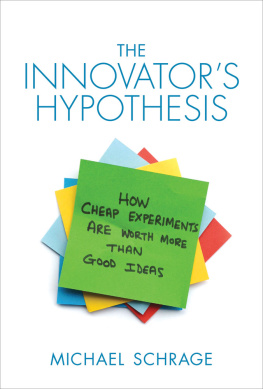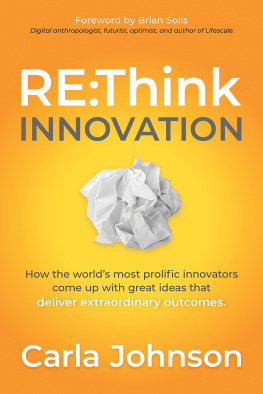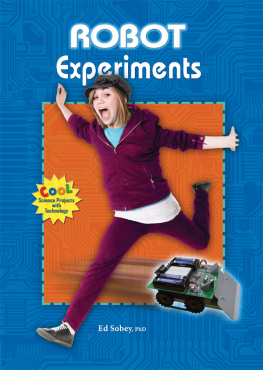Schrage - The innovators hypothesis: how cheap experiments are worth more than good ideas
Here you can read online Schrage - The innovators hypothesis: how cheap experiments are worth more than good ideas full text of the book (entire story) in english for free. Download pdf and epub, get meaning, cover and reviews about this ebook. year: 2014, publisher: MIT Press, genre: Business. Description of the work, (preface) as well as reviews are available. Best literature library LitArk.com created for fans of good reading and offers a wide selection of genres:
Romance novel
Science fiction
Adventure
Detective
Science
History
Home and family
Prose
Art
Politics
Computer
Non-fiction
Religion
Business
Children
Humor
Choose a favorite category and find really read worthwhile books. Enjoy immersion in the world of imagination, feel the emotions of the characters or learn something new for yourself, make an fascinating discovery.
The innovators hypothesis: how cheap experiments are worth more than good ideas: summary, description and annotation
We offer to read an annotation, description, summary or preface (depends on what the author of the book "The innovators hypothesis: how cheap experiments are worth more than good ideas" wrote himself). If you haven't found the necessary information about the book — write in the comments, we will try to find it.
Achieving faster, better, cheaper, and more creative innovation outcomes with the 5X5 framework: 5 people, 5 days, 5 experiments, $5,000, and 5 weeks.
Schrage: author's other books
Who wrote The innovators hypothesis: how cheap experiments are worth more than good ideas? Find out the surname, the name of the author of the book and a list of all author's works by series.
The innovators hypothesis: how cheap experiments are worth more than good ideas — read online for free the complete book (whole text) full work
Below is the text of the book, divided by pages. System saving the place of the last page read, allows you to conveniently read the book "The innovators hypothesis: how cheap experiments are worth more than good ideas" online for free, without having to search again every time where you left off. Put a bookmark, and you can go to the page where you finished reading at any time.
Font size:
Interval:
Bookmark:
The Innovators Hypothesis
The Innovators Hypothesis
How Cheap Experiments Are Worth More Than Good Ideas
Michael Schrage
The MIT Press
Cambridge, Massachusetts
London, England
2014 Massachusetts Institute of Technology
All rights reserved. No part of this book may be reproduced in any form by any electronic or mechanical means (including photocopying, recording, or information storage and retrieval) without permission in writing from the publisher.
Library of Congress Cataloging-in-Publication Data
Schrage, Michael.
The Innovators Hypothesis : how cheap experiments are worth more than good ideas / Michael Schrage.
p. cm.
Includes bibliographical references and index.
ISBN 978-0-262-02836-3 (hardcover : alk. paper)
ISBN 978-0-262-32305-5 (retail e-book)
1. Technological innovations. 2. Creative ability in business. I. Title.
HD45.S367 2014
658.4'063dc23
2014013729
Preface
This is a modest book with an immodest argument: creative experimentation, with and within constraints, makes high-impact innovation a safer, smarter, simpler and more successful investment. It didnt start out that way; I had to experiment.
Back in 1999, the Harvard Business School Press published Serious Play: How the Worlds Best Companies Simulate to Innovate, my book exploring how models, prototypes, and simulations shape innovation culture. The book proved unexpectedly influential. Companies all over the world invited me to work with them. I got unusually serious follow-ups from executive education classes and workshops at MIT. The opportunities were remarkable, the impact terrific.
But I soon discovered something weird. Although they loved using models, prototypes, and simulations to innovate out loud, most organizations seemed less interested in detailed deep dives. Yes, technology companies wanted more collaborative prototyping, and professional service firms sought more dynamic visual simulations. But the majority wanted something different. They wanted their people innovating much faster, much better, and much cheaper. They wanted the organizations best minds and brightest talents engaged in new ways. Enhancing human capital mattered as much as creating new products, services, or both. They desired effective change, not disruptive revolution. These companies craved a simple, fast, and frugal innovation capability.
I confess: my immediate reaction was to repurpose my material and expertise. Id better tailor and customize rapid prototyping and rapid simulation workshops to their briefs. But that frankly wasnt good enough. While modeling and prototyping were great for engineers, developers, and more technical folk, they lacked broader enterprise appeal. I listened more carefully to peoples innovation ambitions, fears, and constraints. I realized I had to reinvent, not just repurpose.
What could businesspeople collaboratively design to create or discover new innovation insights? Experiments. Business experiments. Get small teams from across the enterprise crafting business experiments that make their top managements sit up and lean forward. Push small teams to work collectively to come up with business hypotheses inspiring urgency and curiosity.
But this wouldnt be blue sky/anything goes experimentation. This would be experimentation within constraints: No blank checks, no unlimited budgets. No innovation vacations for meditation and contemplation. Friendly rivalry between small teams. Clear deadlines. Explicit deliverables to top management. Opportunities to experiment out loud in ways commanding strategic attention and respect. These were fresh ingredients for cultural change and market impact. These improvised constraints evolved into the 55 framework presented in this book.
My initial clients and classes couldnt have been more open or receptive. Talented, ambitious people enjoy demonstrating how collaborative and innovative they can be. One of the finest compliments I ever received came from an initial 55 skeptic: When my team first started designing experiments, the exercise seemed ridiculous to me. Now it seems obvious.
Of course, there were disappointments and outright failures. Some teams never grasp the meaning of experimentation or get beyond design clichs (i.e., cutting prices, advertising more, etc.). But the methodologys fast and frugal approach keeps the costs of failure low and the opportunities for organizational learning high.
The ongoing success of 55 in organizations worldwide reflects two fundamental shifts that have transformed my teaching, consulting, and advisory work since Serious Play. The first is transitioning from the practice of selling solutions to the promise of providing an effective approach. The second is moving from the transmission of expertise toward the cultivation of capability.
Those sensibilities have challenged me to pay closer attention to how people learn, rather than what I should teach. The Innovators Hypothesis is rooted in observing what makes 55 teams effective.
Providing the answer is not the answer. Too many solutions either dont solve the problem or dont solve the problem for long. They are frequently too brittle, too complicated, or too customized to cost-effectively adapt to changing circumstance. I prefer presenting clients and students with approachesthat is, methods, tools, and frameworks that put greater power in their hands and minds. Thats more sustainable.
So I help organizations design fast, frugal, and high-impact business experiments that make innovation simpler, safer, and scalable. Thats my mission statement. Thats the goal and purpose of this book. The operational definitions of fast, frugal, and high-impact constantly change. So do the techniques and technologies of simple, safe, and scalable. Theres arguably never been a better time in history to explore and exploit creative business experiments.
When I co-organized an MIT workshop on exponential experimentation in 2009, it was blindingly obvious to everyone in that room that experimentations true economic potential had barely been tapped. I was so excited that I started writing a bookthis bookon the subject. It was going to be a Grand Tour of the experimental future. I started off very strongbut then I stopped. I had a serious crisis of confidence. I doubted myself and what I was doing. I felt I was giving a really good answer to exactly the wrong question. Faster, better, cheaper, and simpler experiments arent the goal; theyre means to an end.
But what should that end be? That question haunted me. The answer is clearer for physics, chemistry, and biology than for industries, companies, and businesses. The more 55s I facilitated, the more organizations I helped run faster, better, and cheaper experiments, the more uncomfortable I became. Yes, we were coming up with terrific hypotheses and experiments. Yes, we were transforming the innovation conversation. But I felt consumed more by the tactics and techniques of experimentation than what experiments should ultimately be for. So I stopped writing. I quit this book and started another. That book made this book possible.
Who Do You Want Your Customers to Become? was published by Harvard Business Review Press in 2012. Its essential insight is that innovation is an investment in the human capital, capabilities, and competencies of customers and clients.
Business history gives great credence to this human capital model of innovation. For example, George Eastman didnt just invent cheap cameras and film; he created photographers. Steve Jobs didnt merely reinvent personal computing and mobile telephony; he reinvented how people physically touched and talked with their technologies. Successful innovators have a vision of the customer future that matters every bit as much as their product or service vision. By treating innovation as an investment in customer futures, organizations can make their customers more valuable. In other words, Making Customers Better Makes Better Customers.
Next pageFont size:
Interval:
Bookmark:
Similar books «The innovators hypothesis: how cheap experiments are worth more than good ideas»
Look at similar books to The innovators hypothesis: how cheap experiments are worth more than good ideas. We have selected literature similar in name and meaning in the hope of providing readers with more options to find new, interesting, not yet read works.
Discussion, reviews of the book The innovators hypothesis: how cheap experiments are worth more than good ideas and just readers' own opinions. Leave your comments, write what you think about the work, its meaning or the main characters. Specify what exactly you liked and what you didn't like, and why you think so.










